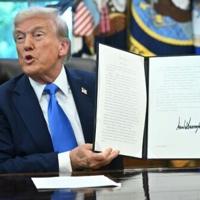India’s leading IT trade body said on Saturday it was concerned by a new annual $100,000 fee that US President Donald Trump ordered for H-1B skilled worker visas, an addition that could have major repercussions for the tech industry where such permits are widespread.
The foreign ministry in New Delhi also said the new measure, which will likely face legal challenges, would cause “disruption” for the families of H-1B visa holders.
Such visas allow companies to sponsor foreign workers with specialised skills — such as scientists, engineers, and computer programmers — to work in the United States, initially for three years but extendable to six.
The United States awards 85,000 H-1B visas per year on a lottery system, with India accounting for around three-quarters of the recipients.
India’s top IT industry body Nasscom said the new measure would hit “business continuity” and was also concerned by the short timeline, with the new fee coming into effect on Sunday.
“A one-day deadline creates considerable uncertainty for businesses, professionals, and students across the world,” Nasscom said in a statement.
“Policy changes of this scale are best introduced with adequate transition periods, allowing organisations and individuals to plan effectively and minimise disruption,” it said.
Trump announced the change in Washington on Friday, along with the introduction of a $1 million “gold card” residency programme he had previewed months earlier.
“The main thing is, we’re going to have great people coming in, and they’re going to be paying,” Trump told reporters as he signed the orders in the Oval Office.
India’s foreign ministry said the mobility of skilled talent had contributed to “technology development, innovation, economic growth, competitiveness and wealth creation” in both countries and that it would assess the changes.
It said in a statement the new measure would likely have “humanitarian consequences by way of the disruption caused for families”, which it hoped would be addressed by US authorities.
– Not enough homegrown talent –
Large technology firms rely on Indian workers who either relocate to the United States or come and go between the two countries.
US bank JPMorgan confirmed that a memo had been sent to its employees with H-1B visas advising them to remain in the United States and avoid international travel until further guidance was issued.
Tech entrepreneurs — including Trump’s former ally Elon Musk — have warned against targeting H-1B visas, saying that the United States does not have enough homegrown talent to fill important tech sector job vacancies.
However, Commerce Secretary Howard Lutnick, who joined Trump in the Oval Office, said: “All the big companies are on board.”
Trump has had the H-1B program in his sights since his first term in office, but faced court challenges to his earlier approach, which targeted the types of jobs that qualify.
The current iteration has become the latest move in the major immigration crackdown of his second term.
The number of H-1B visa applications has risen sharply in recent years, with a peak in approvals in 2022 under Democratic president Joe Biden.
In contrast, the peak in rejections was recorded in 2018, during Trump’s first term in the White House.
The United States approved approximately 400,000 H-1B visas in 2024, two-thirds of which were renewals.
Trump also signed an order on Friday creating a new expedited pathway to US residency for people who pay $1 million, or for corporate sponsors to pay $2 million.
“I think it’s going to be tremendously successful,” he said.
South Korea’s foreign ministry said in a statement on Saturday officials would “comprehensively assess the impact of these measures on the advancement of (South Korean) companies and professional talents into the US market and engage in necessary communication with the US”.
Hundreds of South Koreans were detained during a US immigration raid on a Hyundai-LG battery factory site in the state of Georgia this month.
bur-hol/ash/pbt


